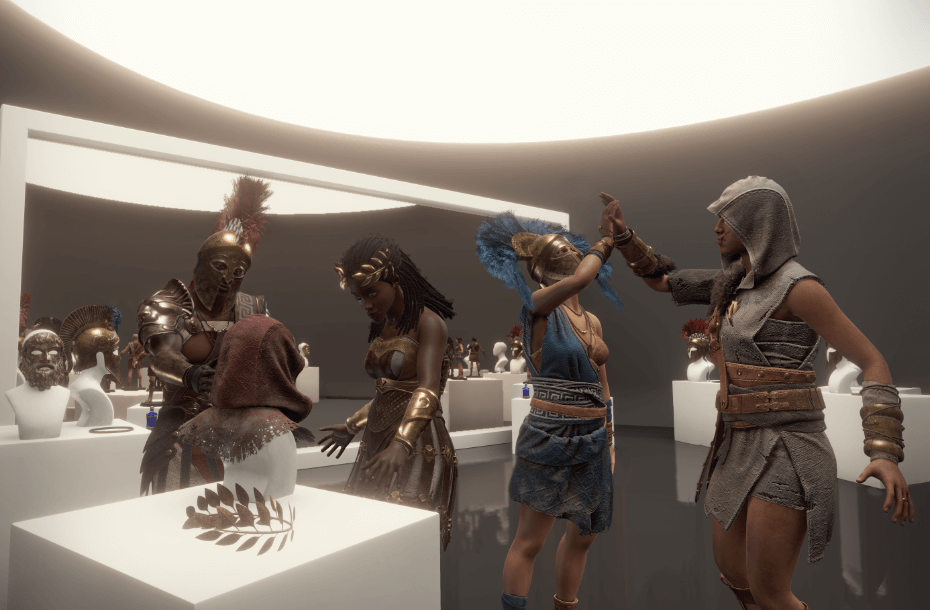Wait, so… What exactly is a VR escape room?
Both Escape the Lost Pyramid and Beyond Medusa’s Gate are essentially non-domestic video games which combine the structure and problem-solving requirements of a typical escape room with the virtual worlds a player is able to inhabit via virtual reality headsets such as the Oculus Rift and HTC Vive (incidentally, both are used here at clueQuest). This means that players who attend the venue do not walk into a space that has been kitted out with gadgets and gizmos; rather they are met with a mostly empty space, in which hang their respective headsets and controllers. Only once they have put these on does their challenge await them.
So that about covers how a VR escape room differs from a normal one, but I’m sure you’re thinking yes, but how is it different to any old VR game? Well, when talking about mainstream domestic VR game titles such as Oculus and White Elk’s Covert or Davevillz’s Pavlov VR, there are currently two primary multiplayer options. The first will be familiar to practically any gamer who has played online - VR or not - in the last decade or so. Players of Pavlov, for example, occupy a shared virtual Battlefield a la Battlefront or Call of Duty while each being situated in their own unique physical space. Because of this though, movement is often limited to point-and-click teleportation only, leaving the player with what is ultimately a slightly more immersive version of what they’ve seen before. The second is known as Hybrid Multiplayer and is a prominent feature of games like the aforementioned Covert or Stuido Studios’s The Take. In these games, only one player wears a headset while the other plays the role of the navigator from the outside world. In the case of the former, one player tries to guide the other through an elaborate heist, while The Take sees players take turns in a hide-and-seek style experience. The downside to the latter being, of course, that while one player marvels in the multicoloured virtual world of the game, the other is left to stare listlessly at their own living room.
Virtual reality escape rooms bridge that all-important gap between these two modes. While one lets users share a virtual space from seperate spots, and the other allows for one-console multiplayer, virtual reality escape rooms allow friends to share the same virtual AND physical space simultaneously. No delay, no connectivity issues, and no waiting around for each member to play their turn. Just a full-on escape experience which requires the teamwork of each and every player. Not only that but thanks to the shared space, the games also allow for a fair amount of organic movement on top of the point-and-click teleportation method mentioned above.

Okay, I get it now… So what’s the plot of these games?
Both games put you, the player, in the shoes of an ancient explorer -- actually, that’s not entirely accurate. Technically, you’re in the shoes of a modern-day ancestor of said explorer whose DNA is being fed into a computer which can then use the data to build a simulation, into which you then enter. Confused? That’s okay, me too a bit…
The upshot is this: Escape the Lost Pyramid and Beyond Medusa’s Gate throw you into ancient Egypt and ancient Greece, respectively. Each play heavily on the time and place’s existing mythology to craft a near-totally believable world at the core of which is an artifact that must be found. In the case of ELP, the journey involved is more or less a climb to the very top of a mystical tomb, complete with vertigo-inducing 90 degree inclines which require the player to master the skill of hopping between rock-ledges with death-defying courage (Top tip: Don’t look down). The teamwork element comes from puzzles which can probably be most closely compared to those seen in traditional console titles such as Naughty Dog’s Uncharted series or Nintendo’s Legend of Zelda. No doubt, this isn’t the first time these games will have been mentioned in conjunction with escape rooms since their typical ‘fend for yourself’ style challenges often feature a distinct lack of guidance beyond engravings on the walls, uniquely shaped holes with matching objects, and anything from bricks to buttons which must be pushed at the same time despite being on opposite sides of the room.
BMG builds upon these game mechanics (and thus is recommended as a follow-on from ELP) while situating the player inside the lair of one of mythology’s most famous creatures: the gorgon Medusa. Expect more climbing, more weapons, and a mightily impressive vessel which is reminiscent of Jason’s Argo after which his crew took their collective name. Oh yeah, and if creepy crawlies give you the shivers… Brace yourself.
.png)
Understood. But are these titles actually any good?
Listen, dear reader. We both know what the answer is going to be. Of course they are. They’re brilliant, in fact. You’ll be hard-pressed to find a better VR experience anywhere else, but of course we have a vested interest. So let’s not worry so much about what we have to say, and let the customers do the talking…
‘We played the “Escape the Lost Pyramid” VR game, and it was definitely the highlight of a weekend we’d packed full of entertainment,’ says TripAdvisor user VictoriaJMS. ‘The room design in the game is fantastic, and the sense of being physically in that room was very real, which made it hugely exciting and challenging. Loved it, would recommend it, and will definitely be going back to play the second VR game!’
Conrad_xiii, another TripAdvisor user, expressed more trepidation in his review, but gave the game five out of five stars: ‘We were unsure what a VR escape room would entail, or even how good the implementation would be. And we all left mightily impressed! The VR is so immersive and you really do feel like you’re in a pyramid working with your friends to escape. The puzzles are challenging and feel right at home within the setting, and are designed for a nice blend of individual and collaborative puzzle-solving. By the time you exit, you’ll feel strange to be back in the real world.’
High praise indeed. But believe me, you won’t get a real feel for these games until you try them for yourself. So what are you waiting for? Let your odyssey begin… Now.
Please note our VR games are suitable for players over 16 only. You can find all of the information on both games by visiting the missions page on our website. Alternatively, our FAQs cover all-sorts of questions you may have regarding VR.
Assassin’s Creed not your thing? Don’t worry,we have another VR escape room coming soon. Sign up to our mailing list to be among the first to know by scrolling to the bottom of our website!

